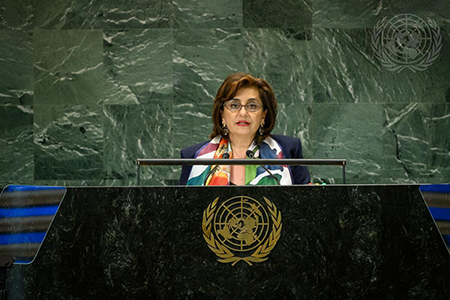World Leaders Adopt UN ‘Pact for the Future’
October 2024
By Shizuka Kuramitsu
World leaders kicked off a new UN initiative designed to address an era of global transformation and catastrophic risk by adopting a “pact for the future” that includes renewed promises to uphold long-standing disarmament obligations and commitments.

The leaders convened the first Summit for the Future on Sept. 22-23 on the sidelines of the UN General Assembly in New York. The groundwork for the meeting was laid in 2022 when the General Assembly adopted a resolution authorizing a summit process that is intended to reaffirm the UN Charter, reinvigorate multilateralism, boost implementation of existing commitments, agree on concrete solutions to challenges, and restore trust among member states.
“Our collective security system is threatened by geopolitical divides, nuclear posturing, and the development of new weapons and threats of war,” UN Secretary-General António Guterres warned in a statement opening the summit on Sept. 22.
“Our multilateral tools and institutions are unable to respond effectively to today’s political, economic, environmental, and technological challenges, and tomorrow’s will be even more difficult and even more dangerous,” he said.
“We must take the first decisive steps towards updating and reforming international cooperation to make it more networked, fair, and inclusive now…. [T]oday, thanks to your efforts, we have,” Guterres added, referring to the summit outcome document.
The summit approved the pact by consensus after an unsuccessful effort to prevent action led by Russia and backed by Belarus, Iran, Nicaragua, North Korea, Sudan, and Syria.
The document paints the present era as “a time of profound global transformation” in which the world is “confronted by rising catastrophic and existential risks, many caused by the choices we make.”
It notes that “[f]ellow human beings are enduring terrible suffering” and warns that “[i]f we do not change course, we risk tipping into a future of persistent crisis and breakdown.” The summit affirmed that its outcomes are important given the challenges posed to the multilateral systems particularly on disarmament issues.
Mexican Foreign Secretary Alicia Bárcena Ibarra called the pact more than “just another United Nations document” because it addresses three specific issues: “the imperative of a world free of nuclear weapons in a context of high military tension; second, the unequivocal need for financing for development; third, the need for reforms to multilateral governance, identifying guidelines for the reform of the [UN] Security Council and the international financial architecture.”
Guterres emphasized that the pact represents “the first agreed multilateral support for nuclear disarmament in more than a decade.”
The nuclear disarmament section was the result of intensive discussions among the five nuclear-weapon states recognized under the nuclear Nonproliferation Treaty (NPT) and members of the New Agenda Coalition, which includes Brazil, Egypt, Ireland, Mexico, New Zealand, and South Africa, diplomatic sources said.
In it, pact supporters expressed “deep concern over the state of nuclear disarmament” and promised to advance the goal of a world free of nuclear weapons; uphold “our respective obligations and commitments” set out in treaties, protocols, and established norms; and “take all steps to prevent nuclear war.”
The pact seeks to revitalize the role of the United Nations in the field of disarmament, including by recommending that the General Assembly pursue work that could support preparation of a fourth special session devoted to disarmament.
Further, the document includes action plans to accelerate efforts to address the potential risks associated with new and emerging technologies involving lethal autonomous weapons systems and the space realm.
